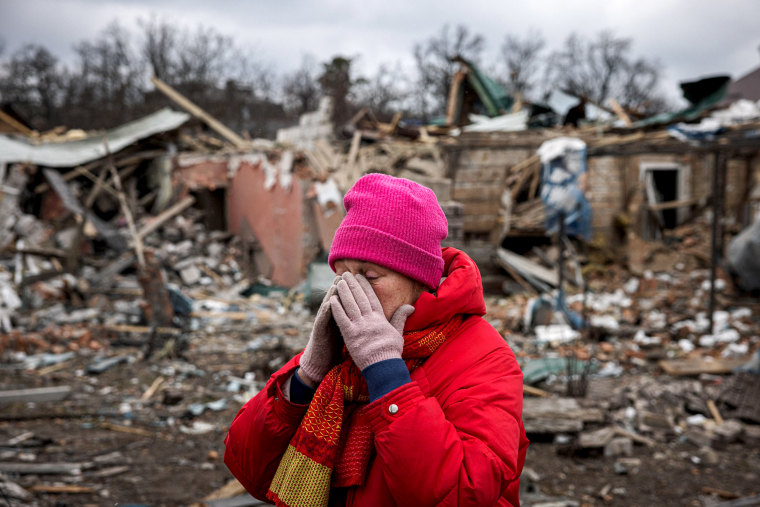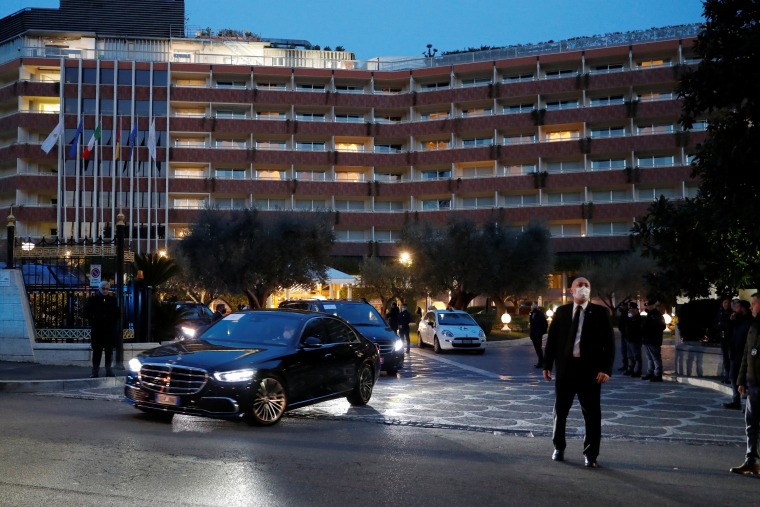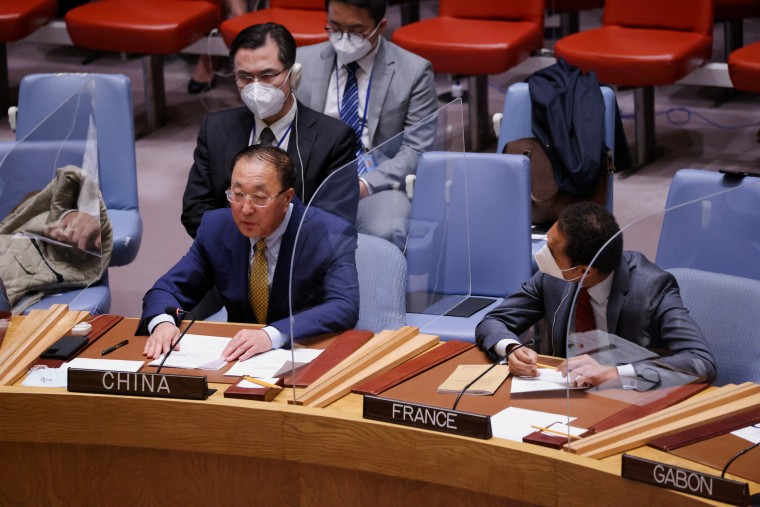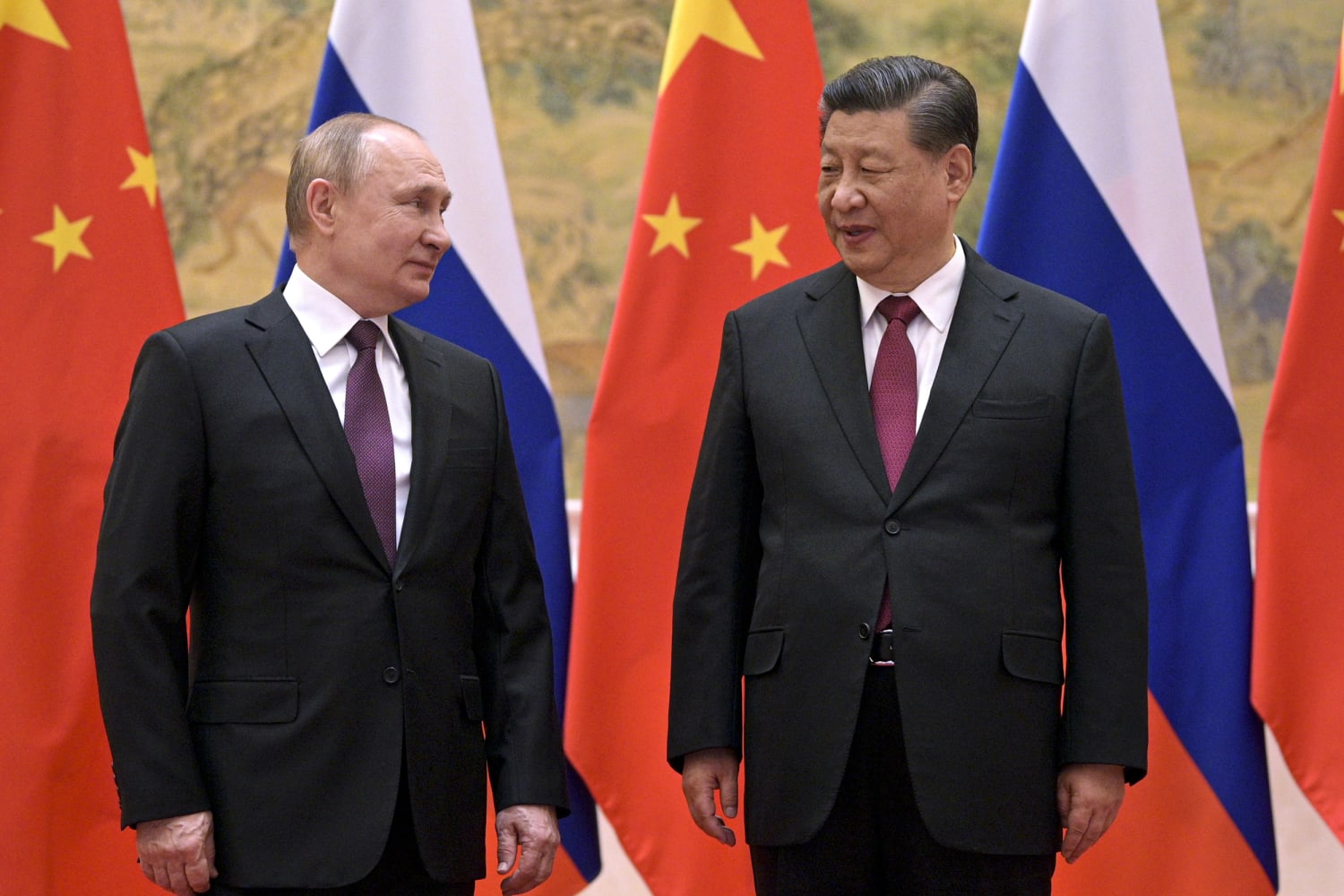HONG KONG — At high-level talks this week, the United States had a clear warning for China: Don’t come to Russia’s aid in its invasion of Ukraine.
U.S. national security adviser Jake Sullivan, who met for seven hours with top Chinese diplomat Yang Jiechi in Rome on Monday, “raised directly and very clearly our concerns” about China’s support for Russia since the invasion and the implications it could have for Beijing’s relationships around the world, State Department spokesman Ned Price said Monday.
China has so far avoided condemning Russian President Vladimir Putin’s attack on Ukraine or calling it an invasion, describing its growing ties with Moscow as “rock solid.”
While expressing concern for the humanitarian situation and calling for a peaceful resolution, Beijing has blamed the United States for the Ukraine crisis and said Western countries should respect Russia’s “legitimate security concerns.” It has also amplified a Russian conspiracy theory that the U.S. is funding chemical and biological weapons activity in Ukraine.
Analysts say what may appear to be China’s silence or even support for Russia’s actions obscures the complex calculus that it faces on the Ukraine crisis, which has not gone the way it expected.
“I think many are not only surprised by what the Russians did, but they’re also surprised by how effective the Biden administration has been in bringing countries together to pressure Russia,” said Stephen Nagy, a senior associate professor in the department of politics and international relations at the International Christian University in Tokyo.
Even as Russian troops converged on Ukraine, China was most likely unaware that Putin planned to invade, said Yun Sun, director of the China program at the Stimson Center in Washington. But Beijing is not about to admit that, she said.
“If they say they knew, they are an accomplice; if they say they didn’t know, they were played by Russia,” she said. “So neither is a viable option.”
Did China know about Russia’s plans?

The nature of Chinese-Russian ties has been in greater focus since February, when Putin and Chinese President Xi Jinping met in Beijing and hailed the “no limits” relationship between their countries. In a joint statement, they declared opposition to any expansion of NATO, the U.S.-led military alliance that Ukraine has expressed an interest in joining.
The U.S.-China meeting in Rome followed a report by American officials that Russia has asked China for military equipment and other support as it faces mounting international sanctions. Officials speaking to NBC News declined to elaborate on what kind of equipment Russia requested, or how China responded.
“I think the Chinese default position is ‘If the U.S. wants us to do something, there must be a play and we should not do it.’”
Yun Sun, director of the Stimson Center’S China program
On Monday, a Chinese foreign ministry spokesperson dismissed the report as “disinformation” from Washington. Russia has also denied asking China for military assistance.
While the details of the two countries’ communication are unclear, experts say Beijing did not seem to expect a full-on Russian invasion of Ukraine. Days before it began, top Chinese academics were adamant in their predictions against it.
One reason Beijing may have been caught off-guard by Russia’s actions, Sun said, is because they are incompatible with the way China views war. Beijing prefers extracting concessions through coercion over the use of force, she said, and with Ukraine menaced by tens of thousands of Russian troops along its borders, China didn’t expect Putin to invade “because they didn’t think he needed to.”
Sun said Beijing also would have been skeptical of intelligence on Putin’s plans for invasion that the U.S. reportedly shared in the hope that Xi would dissuade him. With U.S.-China relations at their lowest point in decades, she said, Beijing might have suspected Washington of trying to drive a wedge between it and Moscow.
“I think the Chinese default position is ‘If the U.S. wants us to do something, there must be a play and we should not do it,’” Sun said.
Download the NBC News app for breaking news and politics
The strongest evidence that Beijing miscalculated, she said, is the “hectic and chaotic” evacuation of Chinese nationals in Ukraine, who numbered about 6,000. Unlike other foreign governments, China did not advise its citizens to leave Ukraine in the days leading up to Russia’s military assault. The Chinese Embassy did not even start registering them until the second day of the invasion, by which point it was too late to charter planes.
Some Chinese nationals in Ukraine complained of a backlash against them over the Chinese government’s position, as well as comments from the Chinese public mocking Ukraine on social media. On March 1, a Chinese citizen was shot and injured while leaving the country, the foreign ministry said, though the details of the shooting are unclear.
All Chinese nationals have been safely evacuated from Ukraine, state media reported last week, citing the Chinese Embassy.
What’s next for China’s relations with Russia?

Russia’s invasion of Ukraine, where it has recognized two breakaway republics, has challenged fundamental principles of Chinese foreign policy, Nagy said, particularly noninterference in other countries’ affairs, and respect for sovereignty and territorial integrity.
“If the concept of sovereignty means anything in practice to a country like [China], we would expect countries like that to stand up, to speak out,” Price said Monday.
In formulating its response, China has had to consider the implications for Taiwan, a self-ruling island that Beijing claims as its territory.
“If China explicitly endorsed the separatists’ plans, against Ukrainian sovereignty, then logically the Japanese, Americans and the others can make similar claims in Taiwan. That’s the kind of logic that the Chinese government would like to avoid,” said Simon Shen, an associate professor at the National Sun Yat-sen University in Taiwan.
Both Beijing and Taipei have said Taiwan is in a fundamentally different position than Ukraine. But China’s takeaways from the Ukraine crisis are “not as positive as people originally expected,” Sun said. Rather than the swift victory Russia had assumed, it has faced staunch resistance both within Ukraine and internationally. If a military invasion of Taiwan were to unfold along the same lines, Sun said, “China will be in very big trouble.”
Washington’s support for Taiwan was underlined this month by visits from former government officials, including a delegation sent to Taiwan by the Biden administration.
China also has major economic considerations in its relations with Russia and Ukraine, both of which are important trade partners. They are also both part of China’s Belt and Road program for global infrastructure investments, and Beijing sees them as gateways to business across Europe.
At the same time, China is increasingly reliant on Russia for imports of energy and food. It recently agreed to lift all restrictions on imports of Russian wheat, drawing criticism that it is giving Moscow an economic lifeline as other countries impose sanctions.
The White House has warned that China will face “significant consequences” if it provides Russia with assistance that violates sanctions or supports the war effort. A Chinese Foreign Ministry spokesman said Wednesday that Beijing would strongly counter any U.S. effort to “damage China’s legitimate rights and interests,” criticizing the U.S. government remarks as “naked bullying and coercion.”
While China has expressed opposition to sanctions, analysts say it does not appear eager to help Russia evade them.
Bloomberg News has reported that two of China’s biggest state-owned banks are restricting financing for purchases of Russian commodities. On March 3, the Asian Infrastructure Investment Bank, a development bank based in Beijing whose members include Russia, said all activities relating to Russia and its ally Belarus were on hold. China is also refusing to provide Russia with aircraft parts after Boeing and Airbus cut off supplies, Reuters reported, citing Russian news agencies.

Experts said it was also notable that China had abstained on United Nations resolutions criticizing the Russian invasion rather than voting against them.
“I think this is a very subtle and diplomatic way to say no,” said Jon Yuan Jiang, an expert on Chinese-Russian relations at the Queensland University of Technology in Australia.
Jiang pointed out that China is mainly focused on domestic concerns, including the pandemic, the economy and its two biggest annual political meetings, which ended Friday. For Xi, stability is paramount as he prepares to seek an unprecedented third term in office at a Communist Party congress later this year.
“China does not want to see this kind of war continue,” Jiang said.
Beijing has made comments suggesting it could play a mediating role, at least in negotiating a cease-fire ahead of broader talks. But if the U.S. and its allies see China as complicit in facilitating Russia’s invasion, they are unlikely to consider it an honest broker, Nagy said.
Wang Huiyao, a Chinese government adviser, said China is ideally placed to play a diplomatic role precisely because it is trying to balance its interests with both Russia and the West.
“China also wants to maintain good relations with the U.S.,” he told NBC News.
Though the Ukraine crisis has created a dilemma for China, experts say, it could still have upsides. For example, China could leverage a weaker Russia to negotiate lower energy prices, Nagy said.
Beijing also stands to benefit if the Ukraine crisis once again diverts the U.S. from its efforts to focus on the Asia-Pacific region, which have already been delayed for years by wars in Afghanistan and the Middle East.
“China has been agonizing over the U.S. Indo-Pacific strategy above anything else,” Sun said.
“If the U.S. is distracted and Russia becomes more dependent on China as a result of this war, it might come out as a winner.”
Source: | This article originally belongs to Nbcnews.com











